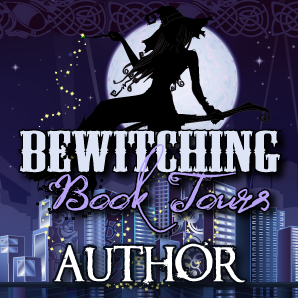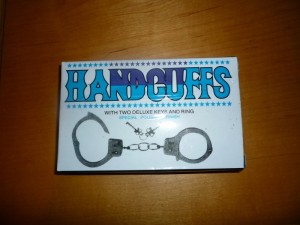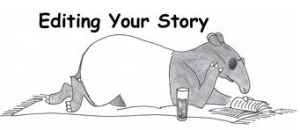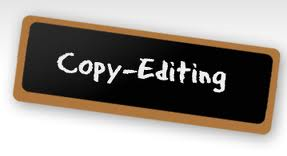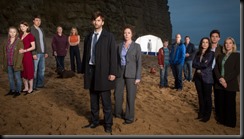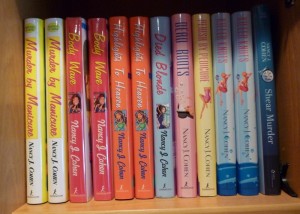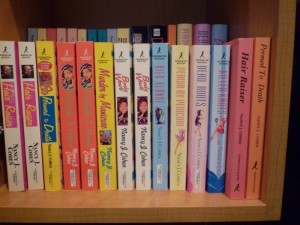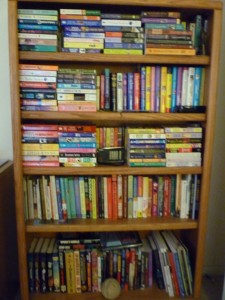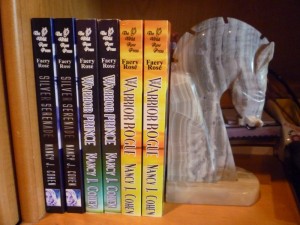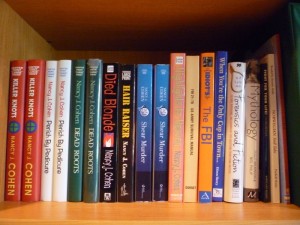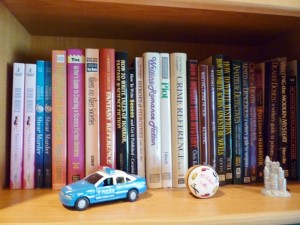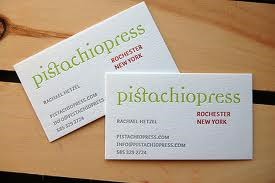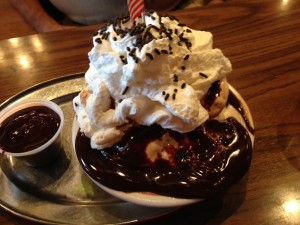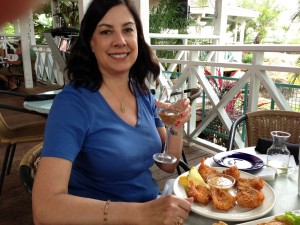Nancy J. Cohen
Today we have the privilege of reading the first page of “PHV.” My critique follows.
“I want out.”
I squared my shoulders and said it louder, “I’m finished. I want out of the firm.” I repeated it three times.
Silence. Then a loud honk from behind let me know the light had turned green. I hit the gas and made the short sprint to the next stoplight. Usually the downtown traffic made me crazy.
However, today I was in no hurry. Today, I planned on telling my dad that I quit. He and the firm could do their deals without me mopping up after billionaire clients and their obnoxious offspring. I was done being his cleaner.
I made a quick right turn the wrong way into an alley and pulled into a trash strewn vacant lot. The garage attached to our office building had been under construction for three months and I’d made a deal with the owner to park here. So far, all he had charged me was getting a nephew out of a marijuana jackpot. Given the price of parking in Dallas, that was cheap.
Practicing my speech one more time in the side view mirror, I grabbed my briefcase and picked my way through the beer bottles and burger wrappers to a hidden door leading to the garage elevator. I’d already ruined on pair of heels in this mess and had no desire to do it again.
Thankfully, the elevator was still running. The construction supervisor told me that until we were out of dutch with the city, it was technically closed down, but they used it anyway. He’d slipped me a maintenance key. The price? One DUI. Again, to avoid walking around the block to the front door, it was well worth a couple of phone calls. I was used to barter. It’s what I did.
The elevator doors slid open at three where my office was located. Since I wasn’t on the letterhead at dad’s law firm; I insisted on being separate from the sixth floor suite. Plus, I didn’t like it up there with the Texas hair and two-thousand dollar boots. I did my best work when I could blend into the background.
To my surprise, the upper floors of the garage were silent. I heard none of the usual jackhammers, concrete saws, and swearing that had greeted me since the building inspector had threatened to condemn the structure. What I did see was the ass end of a black Suburban parked by the landing and I heard voices coming down the stairwell. Something was wrong here. I hadn’t seen a non-construction vehicle on my floor in weeks. Ducking under the plastic chain with the “Out of Order” sign dangling from it, I crossed the short hallway to a window overlooking the front of the building.
MY CRITIQUE FOLLOWS
“I want out.” GOOD OPENING LINE. I AM WONDERING WHAT IT IS HE WANTS TO ESCAPE.
I squared my shoulders and said it louder, “I’m finished. I want out of the firm.” I repeated it three times. DON’T KNOW THAT THE LAST LINE IS NECESSARY. WE GET THE POINT.
Silence. Then a loud honk from behind let me know the light had turned green. I hit the gas and made the short sprint to the next stoplight. Usually the downtown traffic made me crazy.
OOPS, I HAD NO IDEA HE WAS SITTING IN TRAFFIC. HE MAY HAVE BEEN TALKING ON THE PHONE OR IN HIS OFFICE. MAYBE ESTABLISH LOCATION RIGHT AWAY BY SAYING HIS FOOT PRESSED HARDER ON THE BRAKES IN THE SECOND PARAGRAPH?
However, today I was in no hurry. Today, I planned on telling my dad that I quit. He and the firm could do their deals without me mopping up after billionaire clients and their obnoxious offspring. I was done being his cleaner.
OH, SO HE’S TALKING TO HIMSELF? MAYBE MENTION HE’S PRACTICING HIS SPEECH.
CHANGE LINES TO: I pressed my foot harder on the brake and said it louder for practice: “I’m finished. I want out of the firm.”
CLEANER HAS ANOTHER CONNOTATION FOR ME. IF YOU WATCH NIKITA, THAT’S THE NAME FOR THE ASSASSINS WHO DISSOLVE BODIES IN ACID. THEY CLEAN UP FOR THE FIRM, TOO, BUT A DIFFERENT KIND.
I made a quick right turn the wrong way into an alley and pulled into a trash strewn vacant lot. The garage attached to our office building had been under construction for three months and I’d made a deal with the owner to park here. So far, all he had charged me was getting a nephew out of a marijuana jackpot. Given the price of parking in Dallas, that was cheap.
Practicing my speech one more time in the side view mirror, I grabbed my briefcase and picked my way through the beer bottles and burger wrappers to a hidden door leading to the garage elevator. HE’S LOOKING IN THE SIDE VIEW MIRROR AT THE SAME TIME AS HE’S PICKING HIS WAY TO THE DOOR? WATCH YOUR GRAMMAR. I’d already ruined on pair of heels in this mess and had no desire to do it again. HEELS? IT’S A WOMAN? CAN YOU INDICATE THIS SOONER, LIKE WHEN SHE PRESSES ON THE BRAKES?
Thankfully, the elevator was still running. The construction supervisor told me that until we were out of dutch THIS MUST BE SLANG BUT I’M NOT SURE WHAT IT MEANS with the city, it was technically closed down, but they used it anyway. He’d slipped me a maintenance key. The price? One DUI. Again, to avoid walking around the block to the front door, it was well worth a couple of phone calls. I was used to barter. It’s what I did.
The elevator doors slid open at three where my office was located. Since I wasn’t on the letterhead at dad’s law firm; COMMA INSTEAD OF SEMI-COLON I insisted on being separate from the sixth floor suite. Plus, I didn’t like it up there with the Texas hair and two-thousand dollar boots REFERRING TO MEN OR WOMEN HERE?. I did my best work when I could blend into the background.
To my surprise, the upper floors of the garage were silent. GOOD FORESHADOWING I heard none of the usual jackhammers, concrete saws, and swearing that had greeted me since the building inspector had threatened to condemn the structure. What I did see was the ass end of a black Suburban parked by the landing INSERT COMMA and I heard voices coming down the stairwell.
NEW PARAGRAPH. Something was wrong here. I hadn’t seen a non-construction vehicle on my floor in weeks. Ducking under the plastic chain with the “Out of Order” sign dangling from it, I crossed the short hallway to a window overlooking the front of the building. AGAIN, WATCH YOUR “ING” PHRASES. TECHNICALLY, HE’S DUCKNG WHILE CROSSING THE HALLWAY. YOU COULD CORRECT THIS BY ADDING THE WORD “AFTER” BEFORE DUCKING.
NOT SURE OF HER LOCATION HERE. SHE’S STILL IN THE GARAGE? IF SO, WHY IS THERE A WINDOW? MAYBE IT’S BECAUSE I LIVE IN FLORIDA, BUT OUR ABOVE-GROUND GARAGES DON’T HAVE WINDOWS. OPEN AIR SPACES , YES.
MORE COMMENTS:
This story is intriguing in that something is wrong when the narrator arrives at work. I think you’d raise suspense by having the story start there. Like this:
Something was wrong. I hadn’t seen a non-construction vehicle on my garage floor in weeks. So what was that black Suburban doing parked by the landing? Nor did I hear the usual jackhammers or concrete saws that had greeted me ever since the building inspector threatened to condemn the structure.
With some tightening, this could come across as a lot more suspenseful. I’d also prefer a hint of something more about this person other than she plans to quit her father’s firm. That can be rather clichéd. Maybe tell us what she’d rather be doing with her life. I don’t get much of a sense of her personality. It’s a good start, though!
NOTE: I am away on a research trip and will not be able to respond to comments. Thanks in advance for your replies.


